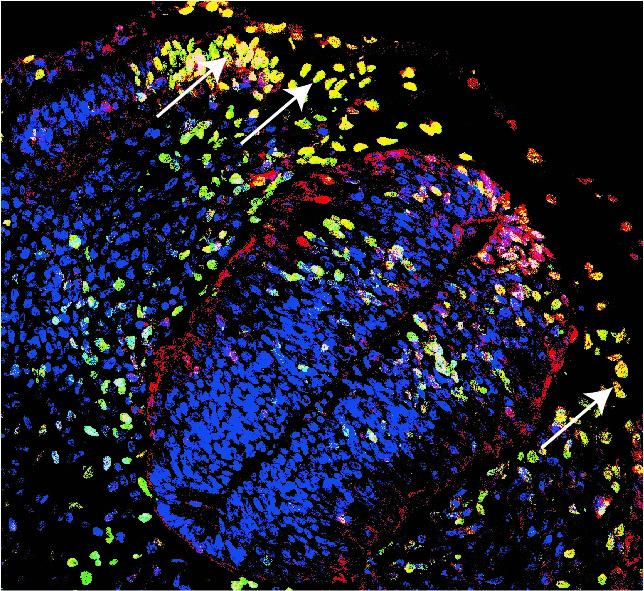
Researchers from Uppsala University report that the metastatic process is helped by the synthesis of new ribosomes. The results open the possibility for new treatment strategies for advanced cancers, according to the scientists whose study (“Ribosome biogenesis during cell cycle arrest fuels EMT in development and disease”) appears in Nature Communications.
“Ribosome biogenesis is a canonical hallmark of cell growth and proliferation. Here we show that execution of Epithelial-to-Mesenchymal Transition (EMT), a migratory cellular program associated with development and tumor metastasis, is fueled by upregulation of ribosome biogenesis during G1/S arrest. This unexpected EMT feature is independent of species and initiating signal, and is accompanied by release of the repressive nucleolar chromatin remodeling complex (NoRC) from rDNA, together with recruitment of the EMT-driving transcription factor Snai1 (Snail1), RNA Polymerase I (Pol I), and the Upstream Binding Factor (UBF),” the investigators wrote.
“EMT-associated ribosome biogenesis is also coincident with increased nucleolar recruitment of Rictor, an essential component of the EMT-promoting mammalian target of rapamycin complex 2 (mTORC2). Inhibition of rRNA synthesis in vivo differentiates primary tumors to a benign, Estrogen Receptor-alpha (ERα) positive, Rictor-negative phenotype and reduces metastasis. These findings implicate the EMT-associated ribosome biogenesis program with cellular plasticity, de-differentiation, cancer progression, and metastatic disease.”
As tumors progress towards advanced stages they dedifferentiate, become more aggressive, and lose the characteristics of the origin tissue. They also acquire the migratory capacity that allows the tumor to metastasize to distant sites in the body, eventually causing patient death.
For epithelial tumors to metastasis the tumor cells undergo a process known as EMT, which allows the cells to develop migratory ability. During EMT, cells also lose their proliferative capacity and become more stem-like. This transition leads to both increased invasiveness and an ability to evade numerous cancer treatments including hormonal therapies.
In the present study, the researchers found that EMT is aided by the synthesis of new ribosomes, which serve to synthesize the proteins required for cell functions. Their study argues that ribosome biogenesis may be more than just a pro-proliferative process.
“Until recently, ribosomes have been considered to play only passive roles during the production of proteins. Our study shows that ribosomes potentially have complex, active roles and suggests that more attention should be given to understanding how ribosomes contribute to cell physiology in health and disease states,” said Theresa Vincent, PhD, group leader at the department of immunology, genetics, and pathology at Uppsala University, who has led the study together with Scott C. Blanchard, PhD, professor in the department of physiology and biophysics at Weill Cornell Medicine.
The researchers also demonstrated that by inhibiting the formation of new ribosomes, aggressive and hormone insensitive tumors could be partially reverted to a benign and non-metastatic type.
“We used a small molecule called CX-5461 to inhibit ribosome biogenesis in mouse models of human tumors. We found that primary tumors reverted from an invasive type to a non-invasive type as well as potentially regaining sensitivity to hormonal therapy. Importantly, CX-5461 treatment also resulted in a marked reduction in the number of lung metastases. This suggests that treatment with CX-5461 may enhance hormone therapy responsiveness in patients where this kind of treatment doesn’t work anymore. We find this to be a remarkable breakthrough and we are currently pursuing a number of additional validation studies,” said Vincent.

